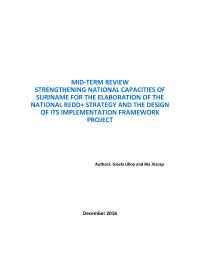
STRENGTHENING NATIONAL CAPACITIES OF SURINAME FOR THE ELABORATION OF THE NATIONAL REDD+ STRATEGY
EXECUTIVE SUMMARY
The “Strengthening national capacities of Suriname for the elaboration of the National REDD+ strategy and the design of its implementation framework” project has a budget of 3.694.000 US$ for the project implementation, from May 2014 until June 2017.
The project is structured around three pillars: (1) human capacities and stakeholder’s engagement; (2) REDD+ strategy; and, (3) implementation framework and tools. It is implemented by the Government of Suriname (GoS) with the United Nations Development Program (UNDP) as delivery partner. The National Institute for Environment and Development in Suriname (NIMOS) serves as the GoS technical focal point for implementation of the project while the Foundation for Forest Management and Production Control (SBB) is also responsible for specific outputs from pillar 2 and 3.
The Mid Term Review (MTR) was scheduled to take place in early 2016 according to the signed Project Document (Prodoc), but the Project Board decided to postpone it until the end of 2016, given absence of progresses in early 2016 and the interest of giving to the recently recruited team in the Project Management Unit (PMU) a chance to perform before being assessed.
The Mid Term Review considers the execution of the project until October 31th 2016 and focuses not only in the progress made, but also on main corrective recommendations towards a successful completion of the Project objectives.
The UNDP financial reports for 2014, 2015 and 2016 (Jan-Oct) show that from the total budget of USD 3.694.000 for the Project, until October 31st 2016 only 23% was executed. The following graph shows the annual and cumulative execution versus the budget.
Graph N 1: Project Annual and Cumulative Execution versus Available Budget
Source: UNDP financial reports 2014, 2015 and 2016
Pillar 1 is the one in which more money has been spent, but it can be noticed that budget execution is still very low (only 34%). Considering the Annual Working Plan presented for 2016 by the Project Management Unit (PMU), only 24% of the budget was executed until October 31st, 2016.
Clearly, there is a very low execution of the project funds so far (only 23% from the beginning to October 31st 2016), and based on the budget for the Annual Working Plan (AWP) 2016, only 24% has been spent, showing a marginal improvement. The numbers show that if the trend of the financial execution remains as it is, in six months, at the end of the Project, the total execution will be less than 50% of the total amount.
Output 1.4. Scaled up action on climate change adaptation and mitigation across sectors which is funded and implemented
Output 2.5. Legal and regulatory frameworks, policies and institutions enabled to ensure the conservation, sustainable use, and access and benefit sharing of natural resources, biodiversity and ecosystems, in line with international conventions and national
Goal 12. Ensure sustainable consumption and production patterns
Goal 13. Take urgent action to combat climate change and its impacts
Goal 15. Protect, restore and promote sustainable use of terrestrial ecosystems, sustainably manage forests, combat desertification, and halt and reverse land degradation and halt biodiversity loss
12.4 By 2020, achieve the environmentally sound management of chemicals and all wastes throughout their life cycle, in accordance with agreed international frameworks, and significantly reduce their release to air, water and soil in order to minimize their adverse impacts on human health and the environment
13.2 Integrate climate change measures into national policies, strategies and planning
15.1 By 2020, ensure the conservation, restoration and sustainable use of terrestrial and inland freshwater ecosystems and their services, in particular forests, wetlands, mountains and drylands, in line with obligations under international agreements
15.2 By 2020, promote the implementation of sustainable management of all types of forests, halt deforestation, restore degraded forests and substantially increase afforestation and reforestation globally
1: Environment & Sustainable Development
2: Others


